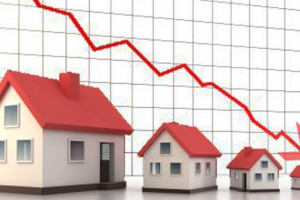The recent decline in Australian housing prices is the greatest we have seen in 9 years. Investors are not pouring funds into property at the same rate as before as rental yields tumble. The royal commission into banking has created a local credit crunch. Many consumers are finding their loan approval amounts have dropped significantly due to stricter lending practices. Three of the big four banks have recently increased their variable interest rates on home loans. This is going to further deter investors or home owners to buy property at the moment. This will in turn have a flow-on effect to certain companies on the share market. These are the stocks to avoid in a housing downturn:
Consumer discretionary
Consumer discretionary stocks in furniture and appliances will be the most affected by a housing downturn. When house prices were increasing and sentiment towards housing was positive, consumers flocked to retailers to furnish their new homes with new furniture and appliances. People are not buying homes at the same rate and hence not visiting these stores anymore. Stocks such as Harvey Norman (ASX:HVN) will be affected as well as Wesfarmers (ASX:WES). Bunnings contributes up to 40 per cent of Wesfarmers earnings. As people are not buying new homes or renovating, they are less inclined to visit stores such as Bunnings. Consumers would also buy less electronics and white goods. This would therefore affect JB Hi-Fi (ASX:JBH).
Clothing retailers will also feel the pinch with the housing downturn. When housing prices are rising, consumers are positive about their financial situation. They therefore feel confident to spend. They may redraw equity from their homes in a rising real estate market and spend it on goods. When the housing market decreases, consumers feel pessimistic about their financial position. This causes them to become careful with their spending. Clothing retailers have been struggling for the last few years. The housing downturn will only cause more consumers to be frugal with their spending.
Banks
Major housing price declines have caused high loan default rates. Australian banks would be vulnerable if housing turns down sharply. The big four banks derive 40-60 percent of their earnings from home loans. A substantial correction may occur if there is a large rise in unemployment and interest rates are hiked rapidly. Some borrowers may feel pressure if these scenarios occurred, resulting in large number of defaults. Household debt to income ratio in the country is at all time high of 190 per cent. If new regulations are introduced from the banking royal commission, it could lead to larger correction with house prices.
Real Estate Investment Trusts (REITs)
The slowing housing market may put pressure on REITs. These are trusts which invest in residential and commercial properties. REITs are affected by the weakness in real estate prices. It is therefore important to understand which REITs are exposed to residential housing, and which ones are exposed to other sectors of the property market.
Property developers
Property developer stocks will take a hit, as prices for residential apartments have dropped and developers have had a difficult time selling units. Investors and home buyers are sitting on their hands at the moment to see if prices will fall any further so at the moment there has not been a huge demand in new developments. Banks are also tightening their lending. So even if prices have dropped for property, investors and home buyers have seen a reduction in the amount the banks are willing to lend to them.
Lauren Hua is a private client adviser at Fairmont Equities.
Sign up to our newsletter. It comes out every week and its free!
Would you like us to call you when we have a great idea? Check out our services.
Disclaimer: The information in this article is general advice only. Read our full disclaimer HERE.
Like this article? Share it now on Facebook and Twitter!

